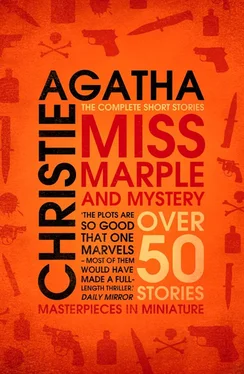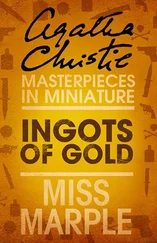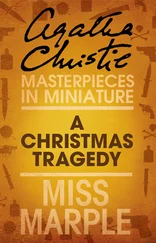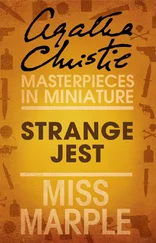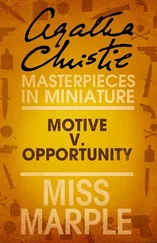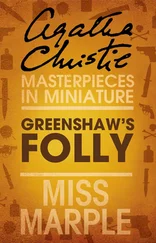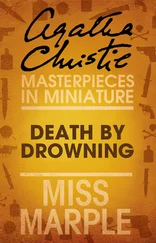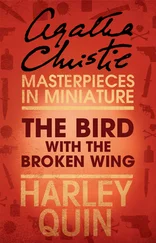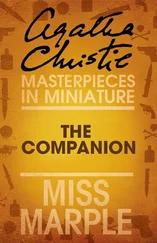He stopped dead with a muffled cry. From beneath the black velvet hangings that draped the window a hand protruded! He stooped and touched it. Cold – horribly cold – a dead hand.
With a cry he flung back the curtains. A woman was lying there, one arm flung wide, the other doubled under her as she lay face downwards, her golden-bronze hair lying in dishevelled masses on her neck.
Olga Stormer! Tremblingly his fingers sought the icy coldness of that wrist and felt for the pulse. As he thought, there was none. She was dead. She had escaped him, then, by taking the simplest way out.
Suddenly his eyes were arrested by two ends of red cord finishing in fantastic tassels, and half hidden by the masses of her hair. He touched them gingerly; the head sagged as he did so, and he caught a glimpse of a horrible purple face. He sprang back with a cry, his head whirling. There was something here he did not understand. His brief glimpse of the face, disfigured as it was, had shown him one thing. This was murder, not suicide. The woman had been strangled and – she was not Olga Stormer!
Ah! What was that? A sound behind him. He wheeled round and looked straight into the terrified eyes of a maid-servant crouching against the wall. Her face was as white as the cap and apron she wore, but he did not understand the fascinated horror in her eyes until her half-breathed words enlightened him to the peril in which he stood.
‘Oh, my Gord! You’ve killed ’er!’
Even then he did not quite realize. He replied:
‘No, no, she was dead when I found her.’
‘I saw yer do it! You pulled the cord and strangled her. I ’eard the gurgling cry she give.’
The sweat broke out upon his brow in earnest. His mind went rapidly over his actions of the previous few minutes. She must have come in just as he had the two ends of cord in his hands; she had seen the sagging head and had taken his own cry as coming from the victim. He stared at her helplessly. There was no doubting what he saw in her face – terror and stupidity. She would tell the police she had seen the crime committed, and no cross-examination would shake her, he was sure of that. She would swear away his life with the unshakable conviction that she was speaking the truth.
What a horrible, unforeseen chain of circumstances! Stop, was it unforeseen? Was there some devilry here? On an impulse he said, eyeing her narrowly:
‘That’s not your mistress, you know.’
Her answer, given mechanically, threw a light upon the situation.
‘No, it’s ’er actress friend – if you can call ’em friends, seeing that they fought like cat and dog. They were at it tonight, ’ammer and tongs.’
A trap! He saw it now.
‘Where’s your mistress?’
‘Went out ten minutes ago.’
A trap! And he had walked into it like a lamb. A clever devil, this Olga Stormer; she had rid herself of a rival, and he was to suffer for the deed. Murder! My God, they hanged a man for murder! And he was innocent – innocent!
A stealthy rustle recalled him. The little maid was sidling towards the door. Her wits were beginning to work again. Her eyes wavered to the telephone, then back to the door. At all costs he must silence her. It was the only way. As well hang for a real crime as a fictitious one. She had no weapon, neither had he. But he had his hands! Then his heart gave a leap. On the table beside her, almost under her hand, lay a small, jewelled revolver. If he could reach it first –
Instinct or his eyes warned her. She caught it up as he sprang and held it pointed at his breast. Awkwardly as she held it, her finger was on the trigger, and she could hardly miss him at that distance. He stopped dead. A revolver belonging to a woman like Olga Stormer would be pretty sure to be loaded.
But there was one thing, she was no longer directly between him and the door. So long as he did not attack her, she might not have the nerve to shoot. Anyway, he must risk it. Zig-zagging, he ran for the door, through the hall and out through the outer door, banging it behind him. He heard her voice, faint and shaky, calling, ‘Police, Murder!’ She’d have to call louder than that before anyone was likely to hear her. He’d got a start, anyway. Down the stairs he went, running down the open street, then slacking to a walk as a stray pedestrian turned the corner. He had his plan cut and dried. To Gravesend as quickly as possible. A boat was sailing from there that night for the remoter parts of the world. He knew the captain, a man who, for a consideration, would ask no questions. Once on board and out to sea he would be safe.
At eleven o’clock Danahan’s telephone rang. Olga’s voice spoke.
‘Prepare a contract for Miss Ryan, will you? She’s to understudy “Cora”. It’s absolutely no use arguing. I owe her something after all the things I did to her tonight! What? Yes, I think I’m out of my troubles. By the way, if she tells you tomorrow that I’m an ardent spiritualist and put her into a trance tonight, don’t show open incredulity. How? Knock-out drops in the coffee, followed by scientific passes! After that I painted her face with purple grease paint and put a tourniquet on her left arm! Mystified? Well, you must stay mystified until tomorrow. I haven’t time to explain now. I must get out of the cap and apron before my faithful Maud returns from the pictures. There was a “beautiful drama” on tonight, she told me. But she missed the best drama of all. I played my best part tonight, Danny. The mittens won! Jake Levitt is a coward all right, and oh, Danny, Danny – I’m an actress!’
‘The Girl in the Train’ was first published in Grand Magazine , February 1924.
‘And that’s that!’ observed George Rowland ruefully, as he gazed up at the imposing smoke-grimed façade of the building he had just quitted.
It might be said to represent very aptly the power of Money – and Money, in the person of William Rowland, uncle to the aforementioned George, had just spoken its mind very freely. In the course of a brief ten minutes, from being the apple of his uncle’s eye, the heir to his wealth, and a young man with a promising business career in front of him, George had suddenly become one of the vast army of the unemployed.
‘And in these clothes they won’t even give me the dole,’ reflected Mr Rowland gloomily, ‘and as for writing poems and selling them at the door at twopence (or “what you care to give, lydy”) I simply haven’t got the brains.’
It was true that George embodied a veritable triumph of the tailor’s art. He was exquisitely and beautifully arrayed. Solomon and the lilies of the field were simply not in it with George. But man cannot live by clothes alone – unless he has had some considerable training in the art – and Mr Rowland was painfully aware of the fact.
‘And all because of that rotten show last night,’ he reflected sadly.
The rotten show last night had been a Covent Garden Ball. Mr Rowland had returned from it at a somewhat late – or rather early – hour – as a matter of fact, he could not strictly say that he remembered returning at all. Rogers, his uncle’s butler, was a helpful fellow, and could doubtless give more details on the matter. A splitting head, a cup of strong tea, and an arrival at the office at five minutes to twelve instead of half-past nine had precipitated the catastrophe. Mr Rowland, senior, who for twenty-four years had condoned and paid up as a tactful relative should, had suddenly abandoned these tactics and revealed himself in a totally new light. The inconsequence of George’s replies (the young man’s head was still opening and shutting like some mediaeval instrument of the Inquisition) had displeased him still further. William Rowland was nothing if not thorough. He cast his nephew adrift upon the world in a few short succinct words, and then settled down to his interrupted survey of some oilfields in Peru.
Читать дальше
